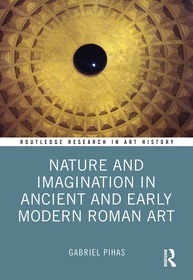
Nature and Imagination in Ancient and Early Modern Roman Art
Sorozatcím: Routledge Research in Art History;
-
20% KEDVEZMÉNY?
- A kedvezmény csak az 'Értesítés a kedvenc témákról' hírlevelünk címzettjeinek rendeléseire érvényes.
- Kiadói listaár GBP 39.99
-
19 105 Ft (18 195 Ft + 5% áfa)
Az ár azért becsült, mert a rendelés pillanatában nem lehet pontosan tudni, hogy a beérkezéskor milyen lesz a forint árfolyama az adott termék eredeti devizájához képest. Ha a forint romlana, kissé többet, ha javulna, kissé kevesebbet kell majd fizetnie.
- Kedvezmény(ek) 20% (cc. 3 821 Ft off)
- Kedvezményes ár 15 284 Ft (14 556 Ft + 5% áfa)
Iratkozzon fel most és részesüljön kedvezőbb árainkból!
Feliratkozom
19 105 Ft

Beszerezhetőség
Becsült beszerzési idő: A Prosperónál jelenleg nincsen raktáron, de a kiadónál igen. Beszerzés kb. 3-5 hét..
A Prosperónál jelenleg nincsen raktáron.
Why don't you give exact delivery time?
A beszerzés időigényét az eddigi tapasztalatokra alapozva adjuk meg. Azért becsült, mert a terméket külföldről hozzuk be, így a kiadó kiszolgálásának pillanatnyi gyorsaságától is függ. A megadottnál gyorsabb és lassabb szállítás is elképzelhető, de mindent megteszünk, hogy Ön a lehető leghamarabb jusson hozzá a termékhez.
A termék adatai:
- Kiadás sorszáma 1
- Kiadó Routledge
- Megjelenés dátuma 2024. május 27.
- ISBN 9781032105604
- Kötéstípus Puhakötés
- Terjedelem186 oldal
- Méret 246x174 mm
- Súly 381 g
- Nyelv angol
- Illusztrációk 68 Illustrations, black & white; 68 Halftones, black & white 565
Kategóriák
Rövid leírás:
This volume uses the art of Rome to help us understand the radical historical break between the fundamental ancient pre-supposition that there is a natural world or cosmos situating human life, and the equally fundamental modern emphasis on human imagination and its creative power.
TöbbHosszú leírás:
This volume uses the art of Rome to help us understand the radical historical break between the fundamental ancient pre-supposition that there is a natural world or cosmos situating human life, and the equally fundamental modern emphasis on human imagination and its creative power.
Rome’s unique art history reveals a different side of the battle between ancients and moderns than that usually raised as an issue in the history of science and philosophy. The book traces the idea of a cosmos in pre-modern art in Rome, from the reception of Greek art in the Roman republic to the construction of the Pantheon, to early Christian art and architecture. It then sketches the disappearance of the presupposition of a cosmos in the High Renaissance and Baroque periods, as creativity became a new ideal. Through discussions of the art and architecture that defines proto-modern Rome— from Michelangelo’s terribilita’ in the Sistine Chapel, Caravaggio’s realism, Baroque illusionism, the infinities of Borromini’s architecture, to the Grand Tour’s representations of ruins— through an interpretation of such major issues and works, this book shows how modern art liberates us while leaving us feeling estranged from our grounding in the natural world.
The book will be of interest to scholars working in art history, architectural history, classics, philosophy, and early modern history and culture.
TöbbTartalomjegyzék:
Introduction 1. The Heavens, Ancient and Modern 2. Ancient Art and the Problem of Hamlet 3. Crossing the Cosmos in Santa Costanza Interlude. A New Theology of Nature 4. Michelangelo’s Renewal of All Things 5. Natural Things in Caravaggio’s Early Religious Paintings 6. Borromini’s Restlessness and the Classical Tradition Epilogue: Nature and Ruin
Több



